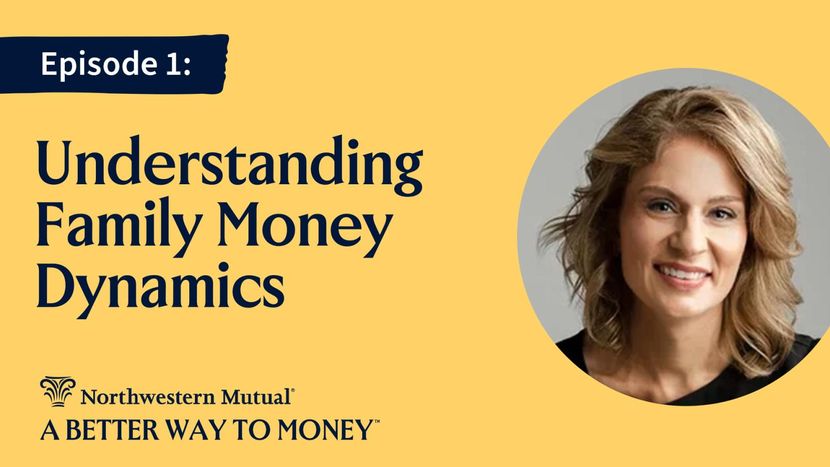Understanding Family Money Dynamics
- A BETTER WAY TO MONEY SEASON 2 EPISODE 1
- May 29, 2025


Whether you want to discuss estate planning with your parents or college funding with your kids, it can feel scary to talk about money with loved ones. In fact, 83 percent of adults say they avoid certain topics at family gatherings, and finances are at the top of that list, according to Northwestern Mutual’s 2024 Consumer Sentiment Survey.
In this week’s episode of A Better Way to Money™, researcher and financial psychologist Dr. Sonya Lutter explains why financial conversations often feel emotionally charged and offers tips to navigate them more smoothly. Lutter shares how childhood experiences shape our financial behavior as adults in ways we may not even recognize.
Need a place to start? Cover these topics when talking with your partner about money.
Early financial experiences often create unconscious thought patterns or “money scripts” that influence behavior. Lutter breaks these scripts down into four general categories—money avoidance, money vigilance, money status and money worship—and explains how they show up in everyday life.
Lutter also discusses the value financial advisors can bring to guide money conversations, noting that couples with financial advisors experience reduced anxiety and increased relationship satisfaction. She also highlights the significance of intergenerational financial planning and the benefits of teaching children about money.
From job changes to raising financially-savvy kids to setting yourself up to retire, we'll have deeper conversations.
[00:00:00] Sonya Lutter Couples feel happier in their relationship when they have a financial advisor.
[00:00:08] Jennifer Borget Money is often one of the most avoided topics at family gatherings. But have you ever wondered why it's so challenging to discuss this with your loved ones? Whether you're planning to talk to your parents about their estate plan, or talking about college funding with your spouse and kids, you'll discover the emotional and practical layers that make these conversations so complex.
Today, I'll be joined by Sonya Lutter, a researcher and financial psychologist, to explore family money dynamics, from their origins to their impact on your planning, saving, and spending habits. We'll also dive into her latest research on the impact financial advisors can make and some expert insights from Northwestern Mutual on the key money topics you should cover with your family and why. When you're ready to get started, head to NorthwesternMutual.com/podcast to download your Ultimate Couples Conversation Starter Kit, along with links to our other episodes on how to make your money work harder for you. But for now, let's dig in.
Hi, Sonya, thank you so much for joining us today. I'm so excited to chat with you about your research. First, before we dive in, can you just tell me a little bit about yourself and your background, and share a little about your research?
[00:01:19] Sonya Lutter Absolutely. First of all, my name is Sonya Lutter, and I am a professor at Texas Tech University, and I'm the director of the Financial Health and Wellness Program. And a lot of that is based off of my prior work in financial planning and marriage and family therapy and blending it into this new area of financial therapy—or financial psychology, if you will.
[00:01:44] Jennifer Borget One thing I was reading about is you talk about “money scripts.” So this is a term that you use in your research, and I want you to dive into this. What is this exactly?
[00:01:54] Sonya Lutter So, let me start by giving a story, and I'm going to put you on the spot. And I want you to imagine for a second that you are in elementary school, and think about the food that you ate in elementary school. When you went out to eat, were you allowed to get soda, or were you only allowed to have water? What were the places you went to eat? When you ate at school, did you bring your own lunch? Did you get free or reduced lunch? Did you ever run out of money on your lunch card? And what about at home? How did you save your leftovers?
I won't actually put you on the spot, but as you're thinking about some of those moments, you start to think about how you felt during those moments, right? And these are what we call our “financial flashpoints.” This is just one of thousands of examples we could give of those points in time where we don't necessarily attach it to money scripts, but they are very much informing the way that we think about and behave around money today. And that's what money scripts are all about: these stories or phrases that we tell ourselves about money—and maybe we don't even realize why we have them, but we go on and repeat them for our friends and our family and other people who are close to us. And we don't really fully grasp it—is this something I truly believe, or is this something I'm just repeating from a past experience in life?
[00:03:38] Jennifer Borget Okay, yeah, I was thinking this sounds like a lot of subconscious stuff that's going on that I'm not really You know aware that I am thinking about based on the story of my life that I had growing up. So, what are some exercises that people can do to create these?
[00:03:53] Sonya Lutter First of all, you need to be in the right mindset, because these are hard issues, and we totally blew past any of the feelings or memories that came up with you, but those can be really negative for people, especially if they started getting bullied at school for the lunch that they brought from home and what it looked like or what it smelled like or what it came in.
I would highly suggest finishing these three statements. And then you can start identifying what these money scripts are. So, start with “Money is” and then fill in the blank. It could be “money is power.” It could be “money is a tool to create experiences.” It could be a whole host of things, but it's up to that person. ... You complete the sentence: “Money makes me feel” whatever feeling you want to attach to it. It could be a positive, it could be neutral, it could be a negative thing.
And then talking about money. Talking about money should be done across all generations. Talking about money is scary. Talking about money is fun. In the research I did with Brad Klontz, we came up with four money scripts that were ultimately created based off starting statements like this and other ones, too.
“Money avoidance” is the people who think that money's bad: I'm not opening up my bank statements. Money status:. Your self-worth equals your net worth. And for people who have this money script, it is very hard for them to see anything else other than people only love them because of the money that they have. Or it would be impossible for their children to have a good relationship with them if they don't buy them everything that they asked for.
“Money worship”: Money is power, money brings me happiness. And then “money vigilance” actually is one of the scripts; that is, as the name implies, people who are very watchful. But let's not believe that this is [always] a positive script because that could easily be negative, too, for the person who is checking into their brokerage accounts every single day. Like, sure, that's vigilant, but that's also not very healthy.
[00:06:20] Jennifer Borget One script I think you mentioned that I found interesting was money avoidance. Because I was looking at some statistics from the Northwestern Mutual Consumer Sentiment Survey from 2024 (last year). They said that finance is the most avoided topic during family gatherings. And that's surprising to me.
So, this all starts subconsciously, I guess when we're younger. Right. Like, you know, avoidance—and then you grow up and you're like, Okay, I just never want to talk about this.
[00:06:53] Sonya Lutter I mean exactly. And you can think about it with couples. I can think of dozens of examples of couples that I've worked with where they don't know what their partner makes. And it's sometimes for very “legitimate reasons” because of the experiences they've had. So this man in his 40s kept track of all of the money. The wife had no idea what was going on. And she didn't know how much the mortgage was. She didn't how much was in the bank accounts. So, in a way, she was very money avoidant because this is the pattern that their relationship was. But she decided she didn't want to be money avoidant anymore. And she wanted to know what the household financial situation was. Yet the husband was perhaps hesitant to share some of the details about the personal financial situation, mostly because that's the pattern that they had always had. But then I asked them to describe, “What's your earliest memory about money?” I gave both of them a tube of brand-new of Play-Doh and asked them to sculpt their earliest memory about money. He made this most beautiful pig out of Play-Doh that you've ever seen in your life. And this was a man who had been very quiet up until this point. I live in Kansas, and every man in Kansas has a pen in their back pocket. So he pulls out the pen. And he's like making indentions on the pig and pulled off a piece and made a cute little tail. It was a really detailed pig.
[00:08:39] Jennifer Borget He understood the assignment. He's like, I'm all in.
[00:08:41] Sonya Lutter Yeah. And then they had to tell a story about their earliest memory and what they sculpted. And I was fully expecting a story of a piggy bank, but this was an actual pig that he had. He grew this pig from a piglet and took it to the county fair. And what happens at the end of a county fair is that the animal is sold. And this adult man was telling this story about spending a whole season raising this piglet to a pig, a whole week at the fair, where it's crazy hot in Kansas. And then at the end of the week, his pig is gone, and his parents took all of the money from the sale of the pig. And yes, it was a very sad moment for him. It was also so impactful for him to recognize I can spend a lot of work on something, and somebody can just come and take that away from me. His wife looked at him and said, “I get it. I understand why you don't want me to see what's in the accounts and why you're so detailed and budgeting our checking account down to the penny each month.” It was such an eye-opening moment for them because he didn't even recognize that that's why he was being so secretive, but not necessarily purposefully secretive. He was just being very vigilant about his financial situation.
[00:10:17] Jennifer Borget I've really enjoyed this conversation so far, especially learning more about how our childhood experiences influence the way we think about money. I've never really considered how I ended up being the splurger in my family, but looking back, it kind of makes sense.
Next, Sonya and I talk about some of the reasons you definitely need to be talking about money, but first we're going to dive into some of those money conversations you might be avoiding. Here's how Northwestern Mutual handles these tricky conversations.
[00:10:46] Speaker We know talking about money can be difficult, but engaging in ongoing and open family money conversations can create new opportunities. We think it's especially important to talk to your spouse or partner. Regular conversations can help ensure you're on the same page. Some of these conversations are practical, like discussing your spending on day-to-day needs like groceries and gas. But other conversations should be focused on your aspirations, like imagining your ideal retirement. If you don't know where to begin, you're not alone. Northwestern Mutual financial advisors help clients like you navigate difficult money situations like these every day. We begin each conversation by asking questions that help us to get to know you and understand what you value. Your family members are an important part of this dialog, so we recommend bringing your spouse or partner and sometimes even your kids into the discussion. We'll design a plan that addresses financial blind spots you may have, and help you turn them into opportunities. Getting started is easy. Visit NorthwesternMutual.com/podcast for more resources on this topic and to connect with your advisor.
[00:11:50] Jennifer Borget I know last season we talked to Tanya Van Court (she's from Goal Setter), and she was talking about having these conversations early with our kids. When we're talking about these money scripts that are coming up, how should we be doing that with our families as we're teaching our kids?
[00:12:13] Sonya Lutter I have 11-, 10- and six-year-olds. Especially the two older ones, they're very interested in how much we make. My philosophy has always been “It is unhelpful to hide the truth.” So, first of all, I ask them, “Why are you interested in it?” And they'll tell me, and I say, “We make more money than the majority of the friends in your class.” And I said, “It's not because we're better or worse than them or anything else. It's that Dad and I went to school for a very long time. And that has enabled us to get good jobs, so we're making more money than other people who didn't go to a school for as long as we did.”
Of course, that's not 100 percent accurate in every situation, but it's a way for them to understand that, yeah, we did have to give something up to be able to get to where we are. But I also don't necessarily talk about dollar amounts because I don't know that that's extremely helpful. And frankly, they don't usually care.
[00:13:27] Jennifer Borget If they can't quantify it anyway at that age, at least.
[00:13:32] Sonya Lutter Exactly.
[00:13:32] Jennifer Borget How are we seeing these relationships change in modern family dynamics? And should I be talking about money differently with my kids?
[00:13:45] Sonya Lutter You know, this is the biggest concern for a lot of parents, and I can't provide any sort of citation for this, but I frequently hear it thrown out that 80 percent of wealth is acquired. So, you are in the majority of parents who have significant money or wealth compared to what they grew up with. They're trying to figure out how they have these conversations. Do I give my child everything that they want because I didn't have those things? Or Let's go on all of the vacations because I really missed out as a child. Or do you not tell them anything at all about money because you don't want them to waste it away? These internal conflicts are very real. I think what I come back to is what I started with: I don't see any helpfulness in lying to children because that's going to create all sorts of confusing messages for them when they get older and they really do figure it out. I also feel very strongly that you can give age-appropriate information that's helpful for them, always starting with “Tell me why you want to know about that.” What our assumption is is not always how their minds work. My six-year-old she wants to know if we have $17. Who knows, maybe she's seen an ad for something that she wants.
[00:15:16] Jennifer Borget ... that cost $17. Maybe she saw a toy at the store.
[00:15:21] Sonya Lutter Do we have enough of that? Do we have enough? “Yes”—which is way more helpful than for you to go to the store, and they'll be like, can I have that toy? And you'll say, “No, we can't afford it.” Is that really a true statement, or are you choosing not to spend your money in that way? Because then the way their minds work, they will think, “Oh, no. We don't have enough money to buy that $17 toy. How are we ever going to pay for these other things?” Or their minds just start working in strange ways.
[00:15:51] Jennifer Borget How is talking to an advisor, something that's maybe like parallel or similar? Or maybe it's totally opposite of talking about it with your family?
[00:16:04] Sonya Lutter It's really quite similar because—you said it earlier—people don't like to talk about money. In other research that I did with Northwestern Mutual, we did look at this very issue of how are conversations with advisors, and what do people want? And even when people have these higher levels of anxiety, they decrease after conversations with advisors. And I think it is pretty remarkable that if you can just get the conversation started, you'll start to see immediate decreases in your financial anxiety. I've seen this in other research, too, that I've done where couples actually have increased relationship satisfaction. Same with this Northwestern Mutual household paper where I'm talking about how couples feel happier in their relationship when they have a financial advisor.
[00:16:58] Jennifer Borget Wow! Right?
[00:17:01] Sonya Lutter It's a very scary face right there.
[00:17:03] Jennifer Borget I know. I was going to say, marriage counseling financial advisor language.
[00:17:09] Sonya Lutter Which makes sense.
[00:17:11] Jennifer Borget Can be beneficial. Yeah.
[00:17:12] Sonya Lutter Yeah, it does make sense when you stop and think about it, because it's that opportunity that's scheduled time to have a conversation about money.
[00:17:22] Jennifer Borget Especially if it's something you already don't like talking about, you know, and it's this hurdle that you can't get over. Having that advisor to kind of break the ice and help guide both of you has definitely got to help bring you closer together.
[00:17:34] Sonya Lutter Absolutely.
[00:17:35] Jennifer Borget Is there anything else that we should be aware of not to do when we're talking to maybe our significant other, our family, or an advisor about finances?
[00:17:48] Sonya Lutter If you can avoid starting your statements with you, it's gonna go a whole lot better. Think about it when somebody says to you, “You shouldn't have done that,” or “Why did you spend so much money on that?” Whereas if you approach it with curiosity, it could be, “I'm curious about why this is something that we're prioritizing over this other thing.” You're starting the statement with I. Whenever you say the word you, it puts people on the defense, and they tend to get a little bit stressed about that.
[00:18:29] Jennifer Borget A big thank you to Sonya for joining us today. I really enjoyed our conversation about the power of talking about money, especially with your family. The tip about approaching these conversations with curiosity instead of accusation really struck me. Just asking better questions and actually listening can make such a difference. Definitely something I'm gonna be keeping in mind.
Listeners, join us for our next episode. Don't forget to subscribe and leave us a rating and review, or visit NorthwesternMutual.com/podcast to find more episodes that can help you find A Better Way to Money and to download the Ultimate Couples Conversation Starter Kit.
[00:19:12] Speaker Northwestern Mutual is the marketing name for the Northwestern Mutual Life Insurance Company (NM), and its subsidiaries in Milwaukee, Wisconsin.
Not all Northwestern Mutual representatives are advisors. Only those representatives with “Advisor” in their title or who otherwise disclose their status as an advisor of Northwestern Mutual Wealth Management Company (NMWMC) are credentialed as NMWMC representatives to provide advisory services.
Sonya Lutter, PhD, CFP, LMFT, "The Trust Factor: Key Insights into Planner-Client Relationships," Commissioned research from Northwestern Mutual, 2024.
Sonya Lutter is not affiliated with Northwestern Mutual and the views expressed by Sonya Lutter do not necessarily represent those of Northwestern Mutual or its subsidiaries.
Let’s talk about money—together.
By fostering an environment of open financial communication, we can help you design a plan to reach all life’s milestones.
Find your advisor






